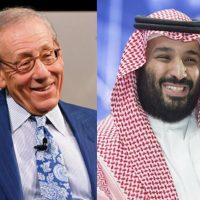On Monday, when oil prices slid below zero for the first time in history, retired English soccer star Gary Lineker poured one out for the Kingdom of Saudi Arabia, the world’s largest oil exporter.
“The poor Saudis will never be able to afford to buy Newcastle now,” Lineker tweeted, referring to a pending $385 million deal by the kingdom’s Public Investment Fund to snap up English soccer club Newcastle United.
The poor Saudis will never be able to afford to buy Newcastle now. https://t.co/itpAhq02xq
— Gary Lineker (@GaryLineker) April 20, 2020
Lineker is no authority on global capital flows. But his remark is worth unpacking for those interested in the vast sums oil-rich nations such as Saudi Arabia, the United Arab Emirates and Norway pump into the U.S. real estate market. Through their sovereign wealth funds, those countries have bought into trophy assets in cities such as New York, Los Angeles and Chicago, and have made big wagers across the country on sectors including industrial real estate.
Saudi’s $320 billion PIF quietly made a huge investment in the Stephen Ross’ Related Companies in February, buying debt that could be converted into 15 percent of the megadeveloper’s equity.
But what happens when the fount of that immense wealth — oil — is in jeopardy?
The oil rout — prices dropped more than $50 a barrel Monday to end the day roughly $30 below zero — means that sovereign-wealth funds, who play the long game and would normally be hungry to acquire institutional-grade assets at the depressed prices the coronavirus has caused, may find themselves in a frustrating spot. Many of these players have heaps of “dry powder,” or capital committed by investors that has yet to be spent. But with huge question marks on the economies of their home countries, they might not be able to capitalize.
Has anyone checked on Mohammed bin Salman
— Karen Attiah (@KarenAttiah) April 20, 2020
“You’re going to have a lot of folks who want to acquire assets when high-quality assets are available at discounts, but may find that they are constrained,” said Sam Chandan, the dean of NYU’s Schack Institute of Real Estate. “Because the supply of funds to make those acquisitions is not there.”
The past two years have already seen the taming of sovereign-wealth funds’ appetites for prime U.S. real estate. In 2018, in all of New York City, sovereign wealth funds sold $945 million more than they bought, according to Real Capital Analytics, the first negative net investment year since 2013. The U.A.E capital Abu Dhabi, one of the most aggressive real estate investors here through a number of sovereign wealth funds, divested itself of several key assets, including the iconic Chrysler Building, which the Abu Dhabi Investment Council sold at a fat loss to Aby Rosen, and 330 Madison Avenue, which the Abu Dhabi Investment Authority sold to German reinsurer Munich RE.
Read more



ADIA, the Middle East’s largest sovereign wealth fund with north of $700 billion in assets under management, will be playing both offense and defense. It will be on the hunt for mispriced assets, according to the Financial Times, but needs to be on standby for any “cash call” if its government decides it needs funds to help more cash-strapped emirates. Gulf sovereign wealth funds could see their holdings plummet by nearly $300 billion by the end of this year, the Institute of International Finance estimated last month, in the form of stock-market losses and drawdowns by cash-squeezed governments.
“Some funds are going to be under a lot of pressure to dispose of assets because their countries need it,” Chandan said.
The Qatar Investment Authority, the state’s $328 billion fund and the holder of a significant stake in Brookfield Property Partners, is in a slightly different boat from the Gulf neighbors with which it’s been in a yearslong feud. That’s because although it’s an oil producer, natural gas — of which it is the world’s second-largest exporter — is the biggest contributor to its coffers. Natural gas hasn’t taken quite the same pummeling as oil. (QIA, through its stake in Vornado Realty Trust’s prime Manhattan retail portfolio, has significant exposure to the real estate sector that’s perhaps taken the biggest hit in the pandemic.)
“Given the volatility in the markets, the QIA is looking for investment opportunities,” a Qatari official told the Financial Times. (Brookfield Property Partners’ parent, Brookfield Asset Management, is separately on the hunt for distressed deals.)
Chandan noted that an even greater threat to sovereign funds’ real-estate investment prospects here would be if a lengthy period of depressed oil prices were to “foment geopolitical instability.” The U.A.E, Qatar and Saudi Arabia are absolute monarchies.
In Saudi Arabia, “you’ve got a young population experiencing elevated unemployment,” he said. “Could the oil price slump be destabilizing to the regime? That could be a wild card in all of this.”
